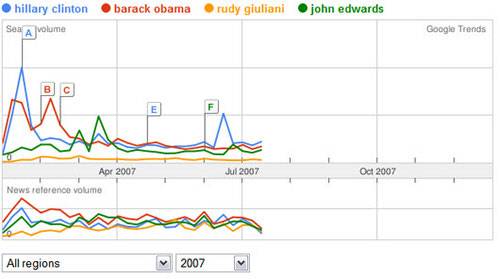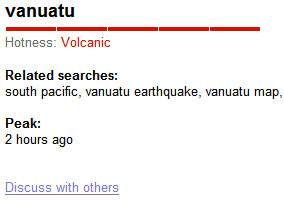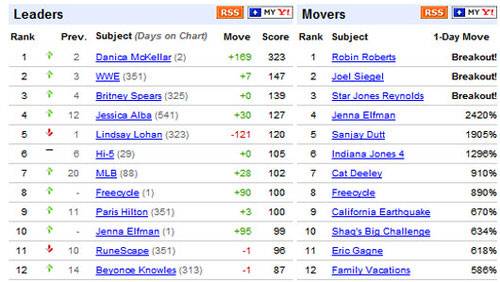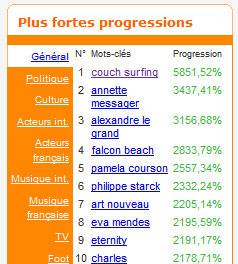As part of this week’s Read/Write Web Files, we’re looking at what may be on the cards in Yahoo’s 100-day strategy for getting its house in order. In the inaugural post of the week, Richard outlined his Top 10 Yahoo! Properties. And I’d like to make the case for another one here: Yahoo! Buzz Index. This post takes a look at how the two biggest internet players, Yahoo! and Google, approach delivering content and services around a specific area: search trend data. Search engines have always had keen insights when it comes to knowing what’s hot and what’s not. It’s as simple as analyzing the volume of search terms over time, and cutting those figures by geolocation, and often other factors. Most web users don’t realize that Google and Yahoo! have created windows to this valuable data that anyone can play around with.

Google’s zeitgeist meter is Google Trends, a well-wrought tool which allows you to peer underneath the surface of Google’s millions of daily search queries. Enter some search terms, and Trends will show you how many searches on those terms have been entered (relative to the total Google searches) over a given stretch of time. News items that relate to spikes in search volume are cleverly placed to the right of the chart, whilst a separate graph below the main one shows the number of times your search term appeared in news items during the same period. Think Facebook has overtaken MySpace as the social network du jour? Well, the search trends indicate that whilst Facebook’s popularity is growing fast, MySpace searches still outnumber Facebook queries significantly. Trends also allows you to drill down into the regions and cities that are most interested in a particular search. In the Facebook vs. MySpace example, you’ll notice that Canadians rather fancy a bit of Facebook, whilst Americans and Aussies are still more curious about MySpace.


You can specify any year or month to target your search back to January 2004. Take, for instance, this comparison of the front-runners in the Democratic race for the US Presidency. Hillary Clinton and Barack Obama swapped successes for much of 2006 and 2007, and Trends says that in terms of raw volume of searches, more people are interested in Hillary than Barack, with John Edwards trailing in their wake. (Republicans look away now if we throw Rudy Giuliani into the mix). However, in the race for attention, it’s all about those column inches, and interestingly, Obama has gained the most press coverage in the same period according to Google News. Want to predict which states favour another Clinton dynasty? Have a look at which cities’ citizens are searching for Hillary: Washington D.C and New York top the list. Meanwhile, big hubs in the Midwest and Mountain states are going bananas over Obama. OK, it’s not the most precise tool for measuring future exit polls, but it’s well worth a snoop around. Google also plans to add more language support to its trends tools; currently it serves its data in English and Chinese only, but tracks search terms in many more, including most European languages.
Want Some Chilli With That?

The Trends data is primarily updated every month, but the more recent addition of Hot Trends gets refreshed every hour. Hot Trends looks for search terms that have spikes in interest on the day you’re curious about. But for each search term, Hot Trends takes a stab at examining why the surge of popularity might have occurred, showing blog entries, related web sites and news items from the day that contain the term. Each term is given a heat rating, and some data about when the peak interest in the term was on the day and where searches were most prevalent. As Josh Catone noted in his news article earlier this year, Hot Trends could be a rich mine of data for online marketers looking to spot some drift in public curiosity over time. However, at the moment, Hot Trends isn’t set up as an analytical tool – just as an interface to daily popular searches.
Google Labs also released two other Trend-based services. Google Music Trends acts as a Billboard chart for the most popular MP3s being played each week by Google Talk users who have opted in to the service. However, since it doesn’t query as broad a cross-section of society as Trends (or Yahoo! Buzz, below), it’s of less value, in our opinion. Then there’s Google History personal trends, for those (egomaniacs?) interested in discovering more about their own personal search patterns.
What’s Missing in Google Trends?
- More frequent updates: Refreshing data every month (or every few months, in the past) just doesn’t create a sticky experience.
- RSS for Hot Trends: This information is ripe for syndication as a daily dose of what’s on the public mind. For those using iGoogle, Marcel Maatkamp has scraped Google Hot Trends to give us his Google Hot Trends Gadget.
- An API: There are a couple mashups appearing from its data at the moment, but as far as we can see this data must have been screen-scraped. If you’d like Google to open this data up for scrutiny, email them at [email protected].
- More advanced timeline with new features: For instance, if stories are geolocated, why not blend Google Maps with the timeline, making the news stories or blog posts appear contextually as well? Making the timeline draggable, as in Google Finance‘s applications, or indeed M.I.T.’s estimable Timeline product, widen the window of the timeline to allow the user to segment the data to the day, and add many more search terms to the list.
- Hyperlinks in the timeline: Why not use Google’s AJAX tooltips a la Google Maps to activate story links on the trends timeline?
- Printable timelines: Being able to print off trend charts would be great for business people wanting to spice up a meeting.
- Editorial ‘in roads’ to the content: Just what Yahoo! does well.
- Business model: Even this executive-level data is useful for marketing agencies and companies. Surely the great minds at Google can think of a way to capitalize on extending the Trends service? Allowing a subscription service to extrapolate deeper, more meaningful information from their data without compromising personal data must be an option.
- Numeric data: Currently Google only shows whether one term has outperformed against another relative to overall traffic. Giving actual numbers of searches next to this relative data may be useful – especially to marketers.
Yahoo! Buzz Index
This all dovetails nicely into Yahoo!’s contribution to the world of trendspotting: the Buzz Index. Here’s how Yahoo! explains the site: “A subject’s buzz score is the percentage of Yahoo! users searching for that subject on a given day, multiplied by a constant to make the number easier to read. Weekly leaders are the subjects with the greatest average buzz score for a given week.” Less geeky and interactive than Google Labs’ offering, the Index presents a stock market-like ticker of the biggest movers and shakers in searches on the day. It’s handily split into categories, so that you can track the online popularity of actors, movies or TV shows, amongst others. Yahoo! has editorialized their service with a blog and RSS support for their updates. Like Google, they’ve also made an attempt at regionalizing their data, with Canadian and French Buzz lists, too.


And since Yahoo! has opened up its Buzz content somewhat through RSS, some mashups are starting to appear from some creative types. Check out this visualizer model, as an example.

What’s Missing in Yahoo! Buzz Index?
- Go! Go! Gadgets: More cool tools that enable the user to play around with the data, please
- Use existing content partnerships: Integrate Flickr photos that have been tagged with the search terms that are on the index. The same line of thinking could be extended to del.icio.us tagging behavior.
- Play around: If editorial ingenuity is what Yahoo’s after, what about a game allowing users to predict future Buzz Listers, a la the BBC’s now famous Celebdaq?
- Make some money: What about linking up the search terms with Last.fm’s playlists? Or iTunes’ top tracks? Surely Yahoo!’s missing a trick here.
Top of the idle Frenchman’s mind today? Couch surfing.

Conclusion
In a sense, Yahoo! Buzz and Google Trends are yin and yang; despite all its nifty graphing and plotting, Google Trends lacks an interesting editorial hook that the Buzz Index delivers in spades. However, Buzz Index only dusts the surface of all the search activity that is going in Yahoo!’s properties. (These approaches mirror the corporate strengths of both companies somewhat: despite its innovative design and technology departments, Yahoo!’s advantage historically has been around expanding its vertical content silos, whilst Google has focused on web tools and services, and until recently shunned overt efforts to create content for its own sake.) If only the two would put aside their differences and unite, we might have a truly useful and interesting tool.





















